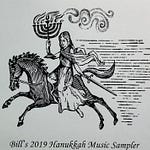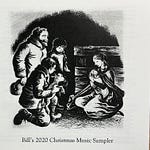Today’s songs
Drinking alcoholic beverages is something of a recurring theme in songs about the midwinter season so I decided to face the issue head on with the November Drinking Song. This recording is from Magpie Lane’s Knock at the Knocker, Ring at the Bell album, released in 2006 by Beautiful Jo Records in England. The album’s sleeve notes say:
This song was written in 1973 by Martin Graebe, for a show called 'Maypoles to Mistletoe' which presents the seasons of the year in songs, poetry and prose. One of the participants, Geoff Harris, lamented the lack of songs about November and this song was the result. We do realise that Christmas isn’t actually in November, but really the sentiments of the song are appropriate for a cold and dreary night in any of the winter months
The lyrics and music for November Drinking Song are in Martin’s songbook Jack in the Green which he freely makes available as an online PDF.
Martin Graebe and his wife Shan are primarily known for their research, biography and online database about the work of the noted folk music collector Sabine Baring-Gould who gathered traditional music from Devon and Cornwall at the end of the nineteenth century.
Touch it Not and Drink, Drink. I felt a need to balance the rather bad advice given in the previous song so I decided to follow it with these two lively temperance songs from The Elastic Millenium Choir’s 2001 album Touch it Not! This is the last album the choir recorded. The Elastic Millennium Choir was based in Halifax, Nova Scotia and specialized in singing shapenote songs that had been in that region’s 19th century choral repertoire, some of which were locally composed.
Both of these songs come from the above non-shapenote songbook The Temperance Chimes, published in 1867 by the National Temperance Society. The words and music for all of the songs in that songbook are available in these PDFs of the original book.
Temperance organizations used many kinds of music as a strategic weapon to attract people into “the cold water army.” Away, Away with Rum, by Gum is the only temperance song that most people are familiar with today, and it is a parody song. It is not clear whether it ever actually existed as a real temperance song, or whether it originated as a music hall parody of lively temperance music like two of today’s songs. The earliest documentation of Away With Rum that anyone on the Mudcat Discussion Forum has found of it is as an 1882 parody.
Essay: Ancient post-harvest festivities [word count 304]
All agricultural societies seem to have traditionally had a joyous festival after the autumn harvest if the harvest has been at least adequate. It is a natural time to celebrate: It is a time of plenty and marks the end of one of the most labour-intensive parts of the agricultural year. It also ushers in the season when cold short days limit the labour that could be accomplished in the days before electricity, and when much more time would be spent relaxing with families and friends.
In those cultures in which a successful harvest was seen as evidence of some kind of divine assistance (i.e., probably all of them) it was considered important, appropriate, or at least expedient, to include giving thanks to their God or gods for the bounty. And then the celebrations could begin in earnest.
This pattern is so ubiquitous that it probably goes back to very ancient times after the invention of agriculture, and possibly even before then when all food was harvested from nature. The timing of the post-harvest celebrations would have varied from year to year depending upon when the actual harvest was completed, and would have varied between different years, different families, and different local communities.
One factor that helped ensure the post-harvest festivities would be joyous would have been the discovery that a fairly-reliable and productive grain crop, barley, can easily be fermented and turned into beer. Beer is one of the oldest drinks (besides water and animal blood) that humans have consumed.
The first chemically-confirmed evidence of beer-making comes from over 7000 years ago in what is now Iran, at about the same time that bread-making was invented. Over a short time-span (in the context of human development) these new technologies spread together with agriculture throughout northern Africa, Asia and Europe. I wonder if a case could be made that beer, rather than bread, was the more important motivator in the spread of agriculture.















Share this post